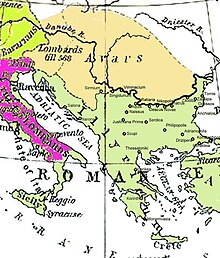D Landnaam vo de Slawe uf em Balkan
Erscheinungsbild

D Landnaam vo de Slawe uf em Balkan het die ethnischie Vilfalt dört um en Elimänt erwiteret, wo bis hüte bräägend isch. Uf dr Balkanhalbinsle het sich under dr römische Herrschaft im Norde die latiinischi Sprooch und südlig vo dr sogenannte Jireček-Linie die griechischi duuregsetzt, bis vom Ändi vom 6. Joorhundert aa slawischi Stämm sich gege dr Widerstand vom Byzantinische Riich dört für immer niidergloo häi (Landnaam). Noch dr Christianisierig dur d Slaweapostel Kyrill und Method häi d Slawe vom 9. Joorhundert aa mit Hilf vo dr orthodoxe Chille s Vermächtnis vo Ostrom im Balkanruum übernoo.[1]
Liddratuur
[ändere | Quälltäxt bearbeite]- Florin Curta: The Making of the Slavs: History and Archaeology of the Lower Danube Region, C. 500–700; Cambridge 2001.
- Walter Pohl: Die Awaren; München 20022
- Michael Whitby: The Emperor Maurice and his Historian – Theophylact Simocatta on Persian and Balkan Warfare; Oxford 1988.
- Franz Georg Maier (Hrsg.): Byzanz (Fischer Weltgeschichte Band 13), Frankfurt a. M. 1973, S. 139ff.
- Spiros Vryonis: The evolution of Slavic society and the Slavic invasions in Greece: The first major Slavic attack on Thessaloniki, A. D. 597; in: Hesperia 50, 1981, S. 378ff.
- Michael Weithmann: Die Slavische Bevölkerung auf der Griechischen Halbinsel. Ein Beitrag zur historischen Ethnographie Südosteuropas. München 1978. ISBN 3-87828-124-2.
Fuessnoote
[ändere | Quälltäxt bearbeite]- ↑ Franz Georg Maier (Hrsg.): Byzanz Fischer Weltgeschichte Bd. 13. Frankfurt a. M. 1973, Seite 139
